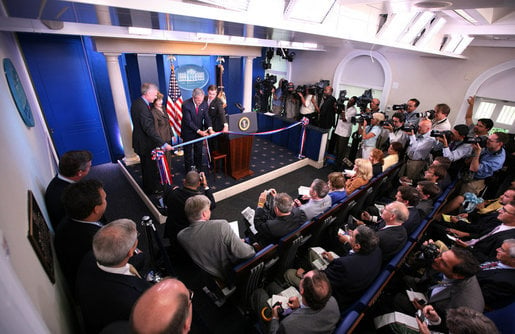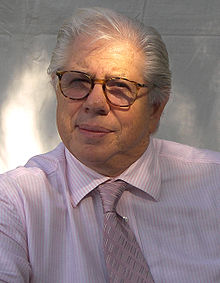
Digging for Truth in a Field of Lies
Learning to Hear the Opposition
What ever would we do without the press?
They dig through the sewer of lies that are daily poured out to entrap us, mislead us, get us to overlook the machinations of the powerful, and lure us into battles about the flag that make us more racist than we have been for a long time.
Journalists do the background checking, and photographers record the moments that let us deal with malignant memories, such as Chief of Staff Kelly through at Rep Wilson. Thank God for the Miami Sentinel, which went to work fact-checking Kelly’s angry remarks and surfaced video to prove him wrong.
And beyond this, the press makes an historical record. And the record lets people like Ken Burns and Lyn Novick produce something as profoundly truthful a the ten part PBS series on The Vietnam War, and an even more moving series on WWI that PBS has aired on its American Experience program.
Two weeks ago was the annual New Yorker Literary Festival, an event I relish.
The opening night offered a panel of White House reporters talking about what it is like to be journalists in the era of Trump, when the press is under constant attack, and specific journalists, who’ve uncovered something meant to stay hidden, are often named and scorned.
Another obstacle the press faces is the casual relationship with truth that prevails in Presidential Tweeting and in White House press briefings.
It’s certainly not new that Presidents and their administrations lie. But the daily stream of lies, many of them transparently untrue, is new, and requires a mountain of work to disprove. Think of the work it took the Boston Globe to unmask the Archdiocese of Boston’s crimes against children. And it is taking hundreds of journalists to uncover the Trump administration.
The New Yorker panel included Jo Becker of the New York Times, Jane Mayer of The New Yorker, Greg Miller of the Washington Post, and Carl Bernstein, the grand old man whose fame arose in the early 70s when he was part of the duo who turned up the truth on Richard Nixon. At this point of his long career he has worked everywhere, and often comments on CNN.
The points made that hang around in my mind, ten days later, are these:
In the midst of a discussion on the sea change in reporting that has happened, where the material reporters are researching comes from Twitter and leaks, Carl Bernstein said he values the Twitter stream because it gives us a roadmap to the President’s mind.
And without it, we would be hugely at sea, since this President has no formal policies, no thoughtful presentations that he does not flip over in a day or a week, and no reliably truthful declarations. The only reliable information given is the emotional truth Trump reveals in his Tweets.
The others had talked about the rather loathsome nature of digging through Tweets, which are rather like a cesspool of bluffs, angers, diversions, fixations, and thoughts.
Their dedication to the task is firm, though, for it does eventually provide some fruit about this president. It was Jo Mayer, who found the first evidence of Russian collusion, before the Inauguration. And now that has become a formal Investigation.
But the more important point was about what has a sinister influence over us. After an exchange of views about the Russian Fake News, which the whole panel found troublesome, they were asked whether they thought it had altered the outcome of the election.
After a brief pause, Bernstein again spoke out, saying he believed that by far the greatest regrettable influence on the election is the current American habit of listening only to news with which the hearer agrees.
Cable networks like FOX and MSNBC make it possible never to leave the bubble of our opinions. And there is a small argument being made by some that only ‘facts’ should be reported, not interpretations of what facts mean.
We have become allergic to one another’s views. Bernstein recalled that in the days when only Cronkite reported the news to the nation, he took pains to present both sides, or more if there were more. And we all at least knew what the opinions of the opposition were.
Compromises were frequent, and understood as the work for which politicans were elected. Not winning. Not total victories. But reworking the possibilities to accommodate something different from each position.
The panel then concurred, each reporter adding a perspective on this, and they all agreed that CNN is commendable for presenting the widest spectrum of points of view. CNN, the network the President disdains.
And we were advised to try to mend the broken conversation in this country by requiring of ourselves that we listen more to those with whom we disagree, and in listening, begin to incorporate some new thinking into our own views.
Since the Inauguration I’ve been listening to CNN far more than ever before. And I have found that my initial revulsion at all conservative views has become more nuanced, as I have found some conservative commentators whom I can respect, if not agree with. I’ve learned to distinguish among their arguments, which before I could not do, which are opportunistic and which have an integrity of thought. And to discern which are blatantly biased against the poor, latinos and blacks, and which are not.
I still return to NPR on a daily basis, which is far less jarring, and to PBS NewsHour, which is methodical yet always fair.
But broadening my listening tastes has helped me understand the task our journalists face daily, in trying to report the strains of thought and the broken threads that pass between us.
________________________________________________________________________________________________
Images: James Brady Press Briefing Room, White House. wikimedia commons image.
Carl Bernstein. Wikipedia image.














